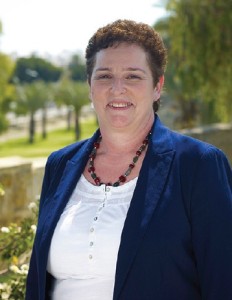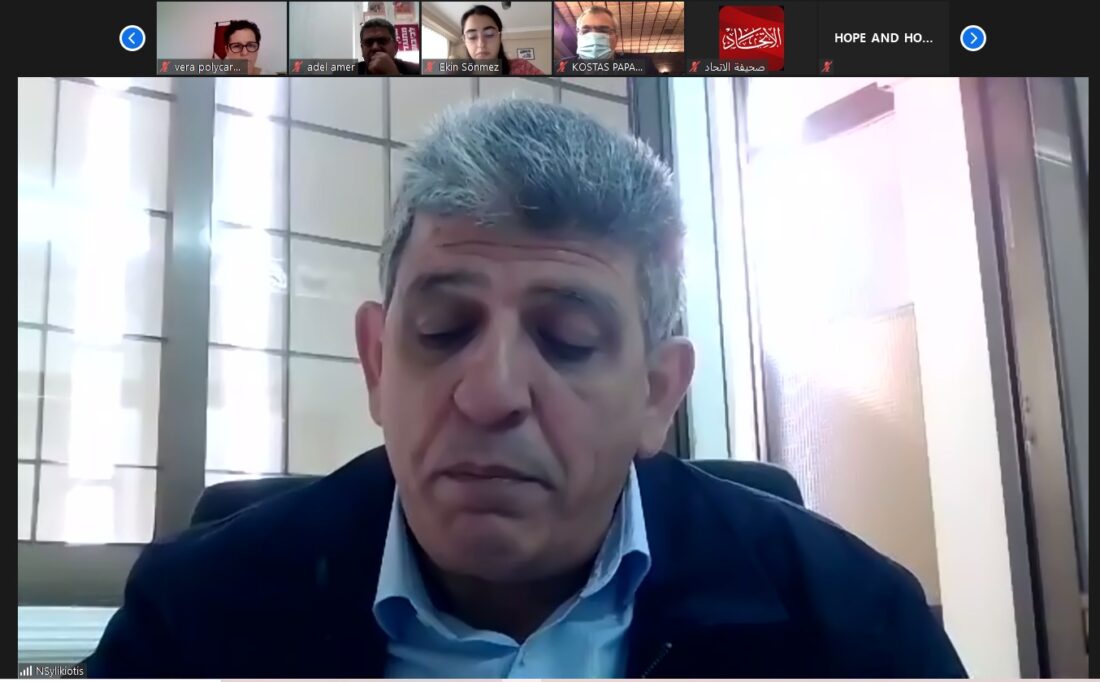
Meeting on EU gender equality policies organized by the Progressive Women’s Movement of POGO and the AKEL Delegation in the Confederal Group of GUE/NGL in the European Parliament
Intervention by Vera Polycarpou, member of the C.C. of AKEL, Head of the European Affairs Bureau of AKEL
20TH March 2019, Limassol
Dear friends,
Five weeks ago, on 12th February, European Commissioner for Justice, Consumers and Gender Equality Vera Jourova in charge of equality issues stated before the plenary session of the European Parliament: “I am not happy either. When I took up the post of Commissioner responsible for gender equality, I expected more progress. But we have to understand the wider environment we are in. Someone called this era a “time of stress”. There is a lot of uncertainty and nervousness in our society, and in such an atmosphere, people tend to turn to bygone traditions and things that somehow proved to have worked in the past. So this period is not particularly favourable for new ideas and trends that are accepted by society in general.”
This admission, but also the attempt to justify it, was made during the debate on the resolution tabled by the Committee on Women’s Rights and Gender Equality (FEMM) entitled ‘Opposition to Women’s Rights and Gender Equality in the EU’. The resolution substantiated by figures and data shows that in recent years a trend reflecting increasing opposition to women’s rights and gender equality has been recorded all over the world. And this concerns labour, economic, social and cultural rights that are in danger due to growing discrimination against and the exclusion of women.
The overall percentage of poverty and unemployment registered among women has increased, while there is still a worrying wage and pension gap between the sexes. This of course also concerns women within the European Union itself.
In the Treaty on the Functioning of the European Union (Articles 8, 153, 10, 19 and 147) and the Charter of Fundamental Rights, it is stipulated that equality between men and women, equal pay for men and women for equal work or work of the same value is safeguarded. The Council of the EU 9 years ago (March 2011) approved conclusions for the European Pact for Gender Equality for the period 2011-2020. They referred to the fact that, despite the considerable number of relevant legislation, successive annual reports released by the European Commission on “Equality between women and men” illustrate that progress in their implementation was slow and equality was not something that should be taken for granted.
The Pact itself was based on the “Europe 2020” strategy, an EU strategy that promised jobs and sustainable development, but in reality led to the deregulation of work/labour relations with painful consequences. The Pact aimed at closing the gender gap at work, social protection, pay, and therefore at reducing poverty and strengthening the potential of the labour force. It also aimed at promoting a better work-life balance, increasing the participation of women in the labour market and contributing towards addressing demographic challenges.
Its third point was to combat all forms of violence against women, to ensure full enjoyment of human rights by women, and the achievement of gender equality. One could say that the real objective was not to attain, or at least to promote equality, but instead to serve the needs of the labour market: that is to say, to supply more workers’ hands.
This year’s European Commission Report on Equality between Women and Men – namely the annual report requested by the Pact mentioned above – shows a 13% gap in male/female employment for the EU of 28 Member States (2018: 79.5% -67.6%) – for Cyprus it is 11.8% (80.8% – 69%). In order not to tire you with numbers, let me say that the reduction (if any) of the gender pay gap across the EU of the 28, the difference in pensions and consequently the measures that are leading to poverty are extremely slow. And these are figures released by the European Statistical Service and the Commissioner herself admits them.
It is clear that no matter how much legislation may be approved, equality at the workplace without the proper control over its implementation, but also without the provision of financial support, won’t be achieved.
A study commissioned by the European Parliament’s Budget Committee on “The EU Budget for Gender Equality” (February 2019), inter alia, concludes the following:
“There has been little or no progress at all in the budgets on the basis of gender from 2015 to the present.
Multiannual Financial Framework 2021-2027 (MFF) does not recognize gender equality.
Even when the EU’s Directorate-General for Budgets demonstrates a readiness to have a greater commitment to gender equality in the political section of its work, weaknesses exist in the legislative framework that appear as an obstacle”.
It goes without saying that by pursuing the neoliberal policies of the European Union and the governments of the member states, one cannot expect that we will attain genuine gender equality – in practice, not on paper and in words.
Very often the participation of women in the Boards of companies or banks is presented as a criterion to judge equality. And of course we have no objection to women being involved in these bodies. But we can hardly be convinced that such participation helps towards achieving equality.
Last week, the plenary session of the European Parliament discussed a resolution on gender balance in appointments to EU posts and positions in the economic and monetary field.
Does one of us really think that, by having a gender balance in these positions, the economic and monetary policies of the European Union will change?
I think we all still remember Delia Velkouleskou, the IMF Mission Chief, as well as Christine Lagarde, Managing Director of the International Monetary Fund.
Or will a woman be appointed to an important position in the European Central Bank if she doesn’t identify with and support the policies of that organization?
I would say the same thing applies to political positions as well.
At the same time, and to avoid any misunderstanding, we should say that we are of course fighting so that gender or the sexual choice/orientation shouldn’t be a criterion for hiring a person for any job. And of course we know that in many cases women are not being hired precisely because they are women. We must intensify our struggles on this front.
Furthermore, I cannot but also express our strong disagreement with the portrayal of the much-advertised policies for the participation of women in EU missions that are in effect military missions in third countries as promoting equality.
We support policies that safeguard peace and enhance cooperation among the peoples, and not any aggressive intervention policies that cause disasters and generate bloodshed. Syria and Palestine are very close to us with Yemen close by too! And these disasters are uprooting people as refugees with women and children being at the heart of the victims. On this occasion, we express our solidarity with all women and struggling peoples, but also with women refugees, immigrant women, the victims of these policies.
Regrettably, as regards violence exerted by men against women across the EU, the numbers are rising and shocking:
- Over 1,000 women die as a result of violence every year.
- 33% of women have been subjected to physical and/or sexual violence.
- 43% have been subjected to psychological violence.
Permit me to make a small parenthesis to mention that the European Parliament, with the contribution of the MEPs and staff of our European United Left/Nordic Green Left Group, has established a #ME TOO committee for complaints and aiming to put an end to any kind of sexual harassment against women and any women in the EP. All our six candidates in the European elections have signed up and committed themselves to the appeal of this committee.
Before we can talk about achieving gender equality in all fields and areas the conditions must be created that will enable every woman to have the same opportunities and rights in education, employment and job promotion. And these conditions concern the fairer distribution of wealth, with greater investment in public services, including care services, health and education.
The Confederal Group of the European United Left/Nordic Green Left, together with AKEL too, during the five year parliamentary term that has passed had set the following priorities for the promotion of women’s rights and gender equality:
- Solidarity, not austerity
- Boosting the employment of women with full respect of the rights of working people, combating unemployment and various forms of precarious work
- Protecting rights enabling both women and men to combine work with parenthood without discrimination in the labour market and social insurance systems
- The right of women to decide freely for their bodies and to have access to lawful and free abortion, as well as high quality public sexual and reproductive health services
- Abolition of all forms of violence against women
- We should also note that our Group has worked consistently against discrimination and for the rights of the LGTB community.
These priorities touch on the essence of inequality’s existence to the detriment of women in all areas. To be able to fulfill these goals and objectives in other areas, we must enhance the strength of our Group within the European Parliament.
Together with 23 other Communist Parties and parties of the broader left we signed a Joint Appeal for the European elections, aiming at the strengthening of our Group, the voice that defends the interests of working people and of course of women too.
In order to strengthen this voice in the European Parliament, we must strengthen the voice of the left in every EU member state. That is why we call on you to vote for the AKEL-Left-New Forces ballot, to strengthen the voice of the Left in Cyprus and in the European Parliament, that is to say the voice that defends and is working – in practice, and not in words – for women’s rights and gender equality.
And in conclusion let me say the following: every day should be the 8th of March.




